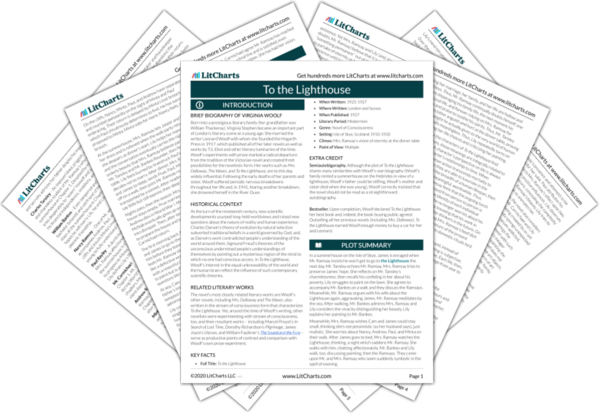Summary
Analysis
Inside parentheses, the text shifts to the perspective of Nancy with Minta, Paul, and Andrew on the cliffs. Nancy had not planned to accompany the others but Minta’s look had asked Nancy to go, so she’d gone. She is not sure what Minta wants. Nancy feels, each time Minta takes her hand as they’re walking, that she sees “the whole world spread out beneath her,” like “Constantinople seen through a mist,” and that she is obliged before it to ask to have its unidentified features named for her: “a pinnacle, a dome; prominent things, without names.” But the view drops away as soon as Minta drops her hand, sinking back into the mist.
Nancy confronts the mysteriousness of other people’s interior lives: she can understand, without Minta having to ask her, that Minta wants her to accompany the walk, but she can’t understand the motive for that want. Thus, Minta’s desire feels to her like a concrete place (as in the metaphor of the city) that she doesn’t recognize the features of (as she can’t identify any of the buildings in the Constantinople of the metaphor).
Themes
Quiz
Test Yourself
Andrew observes Minta is a good walker and, unlike most women, wears sensible clothes and is nearly fearless (though she is irrationally terrified of bulls). He resents Paul quoting facts about the landscape and clapping his back, “calling him ‘old fellow’ and all that” which is “the worst of taking women on walks.” Andrew is relieved to set off on his own once they reach the beach.
Andrew expects women to conform to conventional gender stereotypes and is therefore pleasantly surprised when Minta defies them. Andrew recognizes Paul’s behavior as a performance put on for the women, and resents it.
Themes
Quiz
Test Yourself
Off on her own, too, Nancy imagines that one of the little tide pools is the whole sea, turning “the minnows into sharks and whales” and herself into some God-like “fantastic leviathan” able to dim the sun with her hand. Then, looking up at the real sea, she feels “that vastness and this tininess…flowering within it” making her feel immobilized for “the intensity of feelings…reduced her own body, her own life, and the lives of all the people in the world, for ever, to nothingness.”
Nancy’s game juxtaposes the human imagination of the natural world (which can be contained by interior thought) with the physical fact of the natural world (which is too vast and unknowable to be contained by thought). Compared to the immensity and longevity of nature, all of human history is just a fleeting moment.
Themes
Returning to the beach after a while at Andrew’s bidding, Nancy stumbles on Paul and Minta embracing behind a rock. She is infuriated and she and Andrew put on their shoes in resentful silence, each irritated by the “horrid nuisance” and by the fact of the other’s gender.
For Andrew and Nancy, still too young to have their own romances, others’ romances are nothing but an annoyance and gender differences are something they’d rather not have to think about.
Themes
Quiz
Test Yourself
Get the entire To the Lighthouse LitChart as a printable PDF.

On the way back, Minta suddenly realizes she’s lost her grandmother’s brooch, her only piece of jewelry and most treasured possession. She begins to cry and the group returns to search for it among the rocks. They can’t find it and, since the tide is coming in, they leave with Andrew and Paul promising to return the next day and Minta continuing to sob. Nancy suspects her tears are not entirely for the brooch, but “for something else. We might all sit down and cry, she felt. But she did not know what for.”
As Nancy intuits, Minta’s external behavior is spurred by an interior sorrow that she does not fully articulate, preferring to ascribe her tears to the lost brooch (the implication is that some part of Minta does not want to marry Paul, or perhaps to marry at all). At the sight of Minta’s distress, Andrew and Paul take on the conventional male roles of protector and caretaker.
Themes
Quiz
Test Yourself
Walking back again, Paul boasts to Minta what a good finder he is and assures her he’ll find her brooch, inwardly resolving against Minta’s protests to get up at dawn to do so. “He would prove what he could do.” He feels walking back with Minta that these moments foretold a life’s journey with him leading her by his side. Though it was terrifying to actually propose, he is now eager to tell about it and wants to tell Mrs. Ramsay as he feels she’s “made him” do it by filling him with confidence in himself. Approaching the summerhouse aglow in the darkness, he chants “lights, lights, lights,” then catches himself, not wanting to appear foolish. Close parentheses.
Paul proudly persists in puffing up his image as a conventional male protector of women and imagines that his performance of this role will make Minta as happy as it makes himself. Mrs. Ramsay has cannily orchestrated the marriage she desires not by directly instructing Paul to propose but by boosting his ego. Paul’s chant reflects his interior delight, but he checks himself for the sake of social propriety.
Themes
Quiz
Test Yourself












